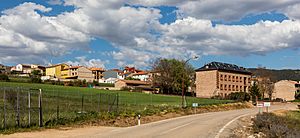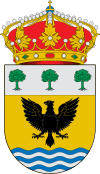Orea facts for kids
Quick facts for kids
Orea, Spain
|
||
|---|---|---|
 |
||
|
||
| Country | ||
| Autonomous community | ||
| Province | Guadalajara | |
| Municipality | Orea | |
| Area | ||
| • Total | 71.25 km2 (27.51 sq mi) | |
| Elevation | 1,502 m (4,928 ft) | |
| Population
(2018)
|
||
| • Total | 177 | |
| • Density | 2.484/km2 (6.434/sq mi) | |
| Time zone | UTC+1 (CET) | |
| • Summer (DST) | UTC+2 (CEST) | |
Orea is a small and peaceful municipality, which is like a local government area, found in the country of Spain. It is located in the province of Guadalajara, within the region called Castile-La Mancha. This charming place sits high up, about 1,502 meters (4,928 feet) above sea level.
As of 2018, Orea was home to about 177 people. It's a quiet community, perfect for those who love nature and a calm environment.
Contents
Where is Orea Located?
Orea is situated in the eastern part of the province of Guadalajara. This province is part of the larger autonomous community of Castile-La Mancha. Spain has 17 autonomous communities, which are like large regions with their own governments.
Geographical Features of Orea
The municipality covers an area of about 71.25 square kilometers. Being at a high elevation, Orea often experiences cooler temperatures. It is surrounded by beautiful natural landscapes. These include forests and mountains.
Population and Community Life
Orea is known for its small population. In 2004, it had 258 inhabitants. By 2018, this number had changed to 177 people. Small communities often have a close-knit feel. Everyone knows each other, and there is a strong sense of community.
What is a Municipality?
A municipality is a local administrative division. It has its own local government. This government manages services for the people living there. These services can include things like local roads and public spaces. Orea's municipality looks after its residents.
Climate and Time Zone
Orea follows the CET zone. This means it is one hour ahead of UTC. During the summer months, like many places in Europe, Orea observes CEST. This moves the clocks forward by another hour. So, it becomes UTC+2.
See also
 In Spanish: Orea para niños
In Spanish: Orea para niños


